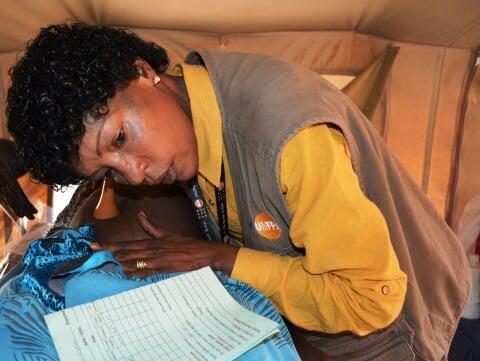Statement by Dr. Babatunde Osotimehin, Executive Director, UNFPA, the United Nations Population Fund
The International Day of the Midwife – marked on 5 May.
Today, on the International Day of the Midwife, we stand in solidarity with midwives worldwide and thank them for the life-saving work they do.
There is no stronger testament to their care and commitment than baby Obada, the 3,000th baby delivered safely at the women’s clinic in the Za’atari Syrian refugee camp in Jordan. Since the clinic started providing normal delivery services in June 2013, all babies have been born healthy and the infant and maternal death rate is zero.
As we approach the deadline to achieve the Millennium Development Goals (MDGs), we are proud of the progress made for Goal 5, to improve maternal health. Maternal deaths have dropped by nearly 50 per cent, down from an estimated 523,000 in 1990 to some 289,000 at latest count.
But while this progress is welcome, it is not enough. Today, nearly 800 women continue to die every day from complications of pregnancy and childbirth.
We must do more. And we must start with training and providing more midwives.
Evidence shows that midwives who are educated and regulated to international standards can provide 87 per cent of the essential care needed by women and their newborns.
Today, we call for greater investments to increase the number of midwives and enhance the quality and reach of their services. Strong political commitment and investment in midwives is needed to save millions of lives every year.
Today and every day, we need to close the gaps in providing universal sexual and reproductive, maternal and newborn health care. These gaps are documented in in The State of Midwifery 2014 report, which points the way forward.
The need for strong health systems and sufficient health workers was recently highlighted by the Ebola epidemic in West Africa, where pregnant women struggled to find available health services to ensure safe delivery. In response, UNFPA is expanding midwifery services to support resilient health systems in the affected countries.
UNFPA will continue to support midwifery and sexual and reproductive health and reproductive rights for all women. Today, UNFPA funds more than 250 midwifery schools with books, training equipment and trained faculty, and has helped train over 15,000 midwives globally.
UNFPA supports midwifery in more than 70 countries worldwide, and in 2014 helped launch Bachelor’s degree programmes in midwifery in Afghanistan, Burkina Faso, Somalia and Zambia.
In the past four years, more than 35 countries have made national pledges to strengthen midwifery. For instance, Ethiopia had pledged to quadruple the number of midwives from 2,050 to 8,635, and will achieve this target ahead of time. Bangladesh pledged to train an additional 3,000 midwives, and some 2,000 midwives are already undergoing training at 31 training centres. Haiti dispatched the first group of midwives last year from its new midwifery school built after the 2010 earthquake. And Afghanistan revived and strengthened community midwifery, which has helped reduce maternal death ratios by more than 80 per cent since 2002.
This year, as we prepare for the post-2015 international development agenda, the future we want is one where midwives play their full role in ensuring safe deliveries, promoting healthy birth spacing, and protecting the health and rights of women and girls.
This year and beyond, all of us at UNFPA will continue to support midwives globally as we strive for a healthy future for present and for generations to come.



